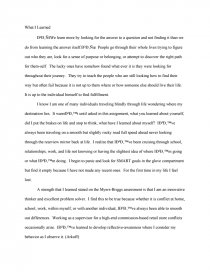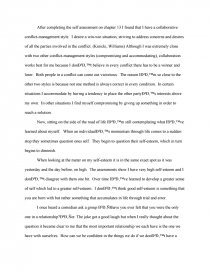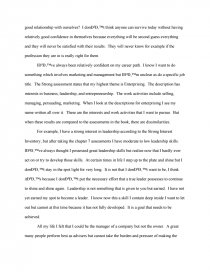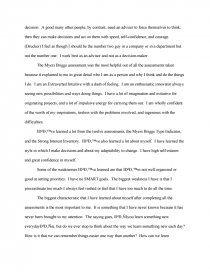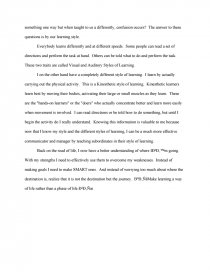What I Learned
Essay by review • January 4, 2011 • Essay • 1,692 Words (7 Pages) • 1,343 Views
What I Learned
“We learn more by looking for the answer to a question and not finding it than we do from learning the answer itself.” People go through their whole lives trying to figure out who they are, look for a sense of purpose or belonging, or attempt to discover the right path for them-self. The lucky ones have somehow found what ever it is they were looking for throughout their journey. They try to teach the people who are still looking how to find their way but often fail because it is not up to them where or how someone else should live their life. It is up to the individual himself to find fulfillment.
I know I am one of many individuals traveling blindly through life wondering where my destination lies. It wasn’t until asked in this assignment, what you learned about yourself, did I put the brakes on life and stop to think, what have I learned about myself? I’ve always been traveling on a smooth but slightly rocky road full speed ahead never looking through the rearview mirror back at life. I realize that I’ve been cruising through school, relationships, work, and life not knowing or having the slightest idea of where I’m going or what I’m doing. I begin to panic and look for SMART goals in the glove compartment but find it empty because I have not made any recent ones. For the first time in my life I feel lost.
A strength that I learned stated on the Myers-Briggs assessment is that I am an innovative thinker and excellent problem solver. I find this to be true because whether it is conflict at home, school, work, within myself, or with another individual, I’ve always been able to smooth out differences. Working as a supervisor for a high-end commission-based retail store conflicts occasionally arise. I’ve learned to develop reflective-awareness where I consider my behavior as I observe it. (Arkoff)
After completing the self assessment on chapter 13 I found that I have a collaborative conflict-management style. I desire a win-win situation, striving to address concerns and desires of all the parties involved in the conflict. (Kinicki, Williams) Although I was extremely close with two other conflict-management styles (compromising and accommodating), collaboration works best for me because I don’t believe in every conflict there has to be a winner and loser. Both people in a conflict can come out victorious. The reason I’m so close to the other two styles is because not one method is always correct in every condition. In certain situations I accommodate by having a tendency to place the other party’s interests above my own. In other situations I find myself compromising by giving up something in order to reach a solution.
Now, sitting on the side of the road of life I’m still contemplating what I’ve learned about myself. When an individual’s momentum through life comes to a sudden stop they sometimes question ones self. They begin to question their self-esteem, which in turn begins to diminish.
When looking at the meter on my self-esteem it is in the same exact spot as it was yesterday and the day before, on high. The assessments show I have very high self-esteem and I don’t disagree with them one bit. Over time I’ve learned to develop a greater sense of self which led to a greater self-esteem. I don’t think good self-esteem is something that you are born with but rather something that accumulates in life through trial and error.
I once heard a comedian ask a group “have you ever felt that you were the only one in a relationship?” The joke got a good laugh but when I really thought about the question it became clear to me that the most important relationship we each have is the one we have with ourselves. How can we be confident in the things we do if we don’t have a good relationship with ourselves? I don’t think anyone can survive today without having relatively good confidence in themselves because everything will be second guess everything and they will never be satisfied with their results. They will never know for example if the profession they are in is really right for them.
I’ve always been relatively confident on my career path. I know I want to do something which involves marketing and management but I’m unclear as do a specific job title. The Strong assessment states that my highest theme is Enterprising. The description has interests in business, leadership, and entrepreneurship. The work activities include selling, managing, persuading, marketing. When I look at the descriptions for enterprising I see my name written all over it. These are the interests and work activities that I want to pursue. But when these results are compared to the assessments in the book, there are dissimilarities.
For example, I have a strong interest in leadership according to the Strong Interest Inventory, but after taking the chapter 7 assessments I have moderate to low leadership skills. I’ve always thought I possessed great leadership skills but realize now that I hardly ever act on or try to develop those skills. At certain times in life I step up to the plate and shine but I don’t stay in the spot light for very long. It is not that I don’t want to be, I think it’s because I don’t put the necessary effort that a true leader possesses to continue to shine and shine again. Leadership is not something that is given to you but earned. I have not yet earned my spot to become a leader. I know now this a skill I contain deep
...
...
